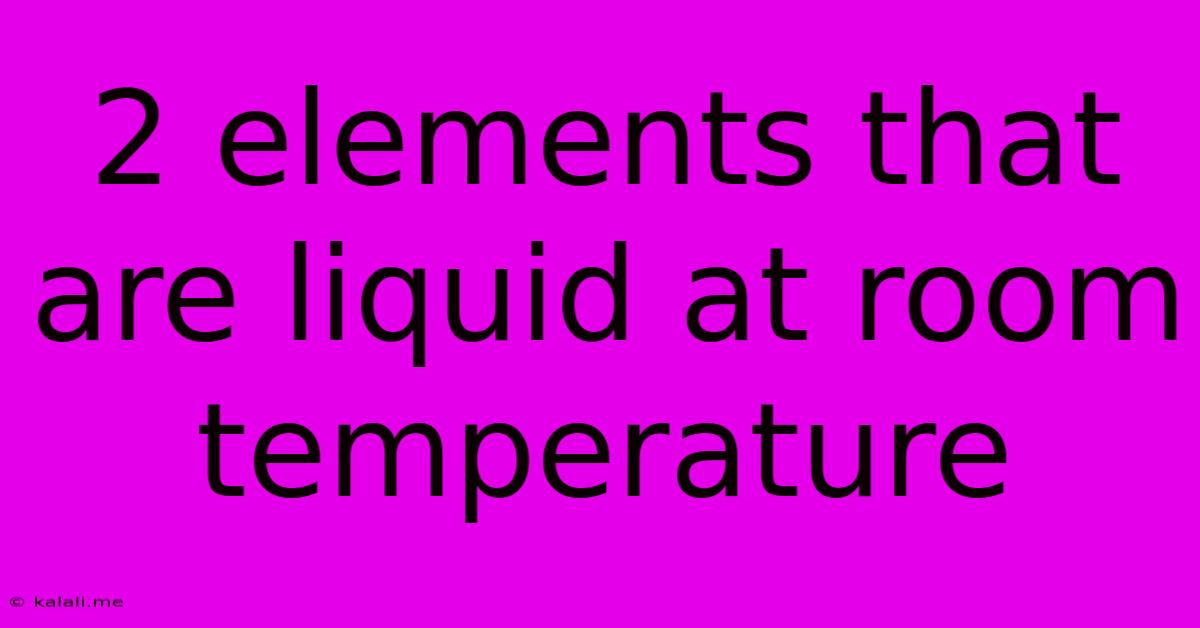2 Elements That Are Liquid At Room Temperature
Kalali
Jun 16, 2025 · 3 min read

Table of Contents
Two Elements That Are Liquid at Room Temperature: Mercury and Bromine
This article explores the fascinating world of elements that exist as liquids at room temperature – a rarity in the periodic table. Only two elements naturally exhibit this property: mercury and bromine. Understanding their unique characteristics and properties sheds light on the diverse behaviours of matter under normal conditions.
Mercury (Hg): The Shining Liquid Metal
Mercury, a heavy, silvery-white liquid metal, is perhaps the most well-known element in this exclusive club. Its unique fluidity and high density have led to its use in various applications throughout history, although many have been phased out due to its toxicity.
-
Properties: Mercury boasts a high surface tension, allowing it to form perfect spheres. It's also a remarkably poor conductor of heat, a fact that makes it useful in some specialized applications. Its liquid state is a consequence of its weak metallic bonding.
-
Uses (Past and Present): Historically, mercury was used in thermometers, barometers, and other scientific instruments. It also found applications in dentistry (though largely discontinued due to safety concerns) and in some industrial processes. Today, its uses are much more restricted because of its hazardous nature.
-
Toxicity: Mercury is highly toxic and poses significant environmental and health risks. Inhalation, ingestion, or skin contact can cause serious neurological damage. Proper handling and disposal are paramount when working with mercury or mercury-containing materials.
Bromine (Br): The Reddish-Brown Liquid Non-metal
Unlike mercury's metallic sheen, bromine is a dense, reddish-brown liquid non-metal with a pungent, irritating odor. Its highly reactive nature makes it a key player in various chemical reactions.
-
Properties: Bromine's volatility is a defining characteristic. It readily evaporates at room temperature, producing a vapor that is both toxic and corrosive. This volatility stems from its relatively weak intermolecular forces.
-
Uses: Bromine's primary application lies in the production of flame retardants, although concerns about their environmental impact have led to decreased usage. It also finds applications in the production of certain pharmaceuticals and agricultural chemicals.
-
Reactivity: Bromine is a highly reactive element, readily forming compounds with many other elements. This reactivity makes it a crucial component in various industrial chemical processes. Safety precautions are vital when handling bromine due to its corrosive and toxic nature.
Why So Few Liquid Elements?
The scarcity of liquid elements at room temperature is primarily due to the interplay between intermolecular forces and atomic structure. Most elements exist as solids due to strong interatomic forces holding their atoms tightly together. Gases, conversely, have weak intermolecular forces, allowing their atoms to move freely. Only elements with a specific balance of these forces exist as liquids under standard conditions. Understanding this balance provides valuable insight into the fundamental principles of chemistry and the physical states of matter.
In conclusion, while the existence of only two elements as liquids at room temperature might seem unusual, their unique properties have shaped their roles in scientific advancements and industrial applications, even if some of those applications have been re-evaluated based on modern safety and environmental considerations. The study of mercury and bromine helps highlight the fascinating diversity and complexity of the periodic table's elements.
Latest Posts
Latest Posts
-
Difference Between Keratinized And Nonkeratinized Epithelium
Jun 16, 2025
-
Whats The Difference Between Hypothesis And Prediction
Jun 16, 2025
-
What Is The Prime Factorization For 124
Jun 16, 2025
-
Difference Between Economies Of Scope And Economies Of Scale
Jun 16, 2025
-
Difference T Test And Z Test
Jun 16, 2025
Related Post
Thank you for visiting our website which covers about 2 Elements That Are Liquid At Room Temperature . We hope the information provided has been useful to you. Feel free to contact us if you have any questions or need further assistance. See you next time and don't miss to bookmark.